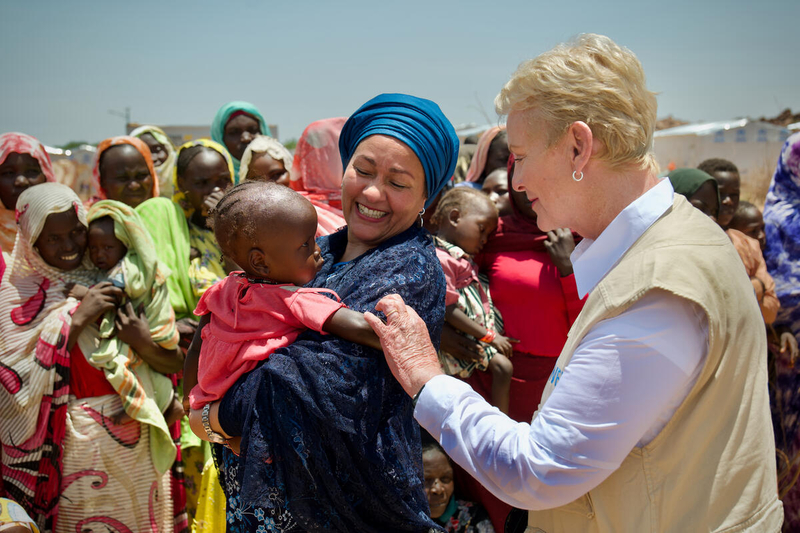In Chad, the Executive Director witnessed firsthand how conflict, climate shocks, and high food and fuel costs are pushing millions into acute hunger and malnutrition. Chad hosts the largest refugee population of any country in West and Central Africa and is also gripped by its own rising food insecurity.
"The global community faces a decision point," said McCain. "We act now and stop Chad from becoming another victim of this crisis that has gripped the region or wait and act when it's too late."
The Executive Director travelled together with the United Nations Deputy Secretary-General Amina Mohammed to the border with Sudan, where some 330,000 people - the vast majority of whom are women and children - have already crossed to escape violence. They visited WFP's teams who are working around the clock to respond to the emergency as it unfolds.
"The people I spoke with on the Chad-Sudan border told me absolutely heartbreaking stories of their dangerous journey, and of loved ones they lost along the way," McCain said. "Too many are injured and malnourished. This is the price innocent people pay for war; what these people have been through is unacceptable, and the world must step up and help them."
Needs are soaring in Chad, but funding is not keeping pace. WFP urgently requires $157 million to reach those in need and to stabilize the deteriorating situation. WFP plans to reach 2 million refugees and vulnerable Chadians with emergency assistance but cannot even assist half of them due to insufficient funds.
McCain also visited Abeche to see WFP's resilience projects that are transforming communities by laying the groundwork for sustainable food systems and self-sufficiency.
The Executive Director continued to Togo, where she met the President, and Benin, where she met the Vice President and Government Ministers, to discuss areas of collaboration, such as School Feeding and the transformational impact this can have on children and communities. They also discussed the wider impacts and risks of crisis in the Sahel, and how WFP, together with national governments, can act early to foster stability.
"I am impressed by the leadership and commitment of the Government of Benin in promoting a holistic development of children through a government led and owned national school feeding programme," McCain said. "This is a clear example of how WFP and national governments can work together to achieve human capital development and the overall well-being of future generations."
Amidst the rising of violence in the Sahel, WFP stands ready and committed to supporting national governments in emergency preparedness and response.
"We are increasingly concerned about an overflow from the security crisis in the Sahel into coastal countries - particularly the Gulf of Guinea," said McCain. "Urgent action is needed if we do not want to see the crisis spiral out of control."







